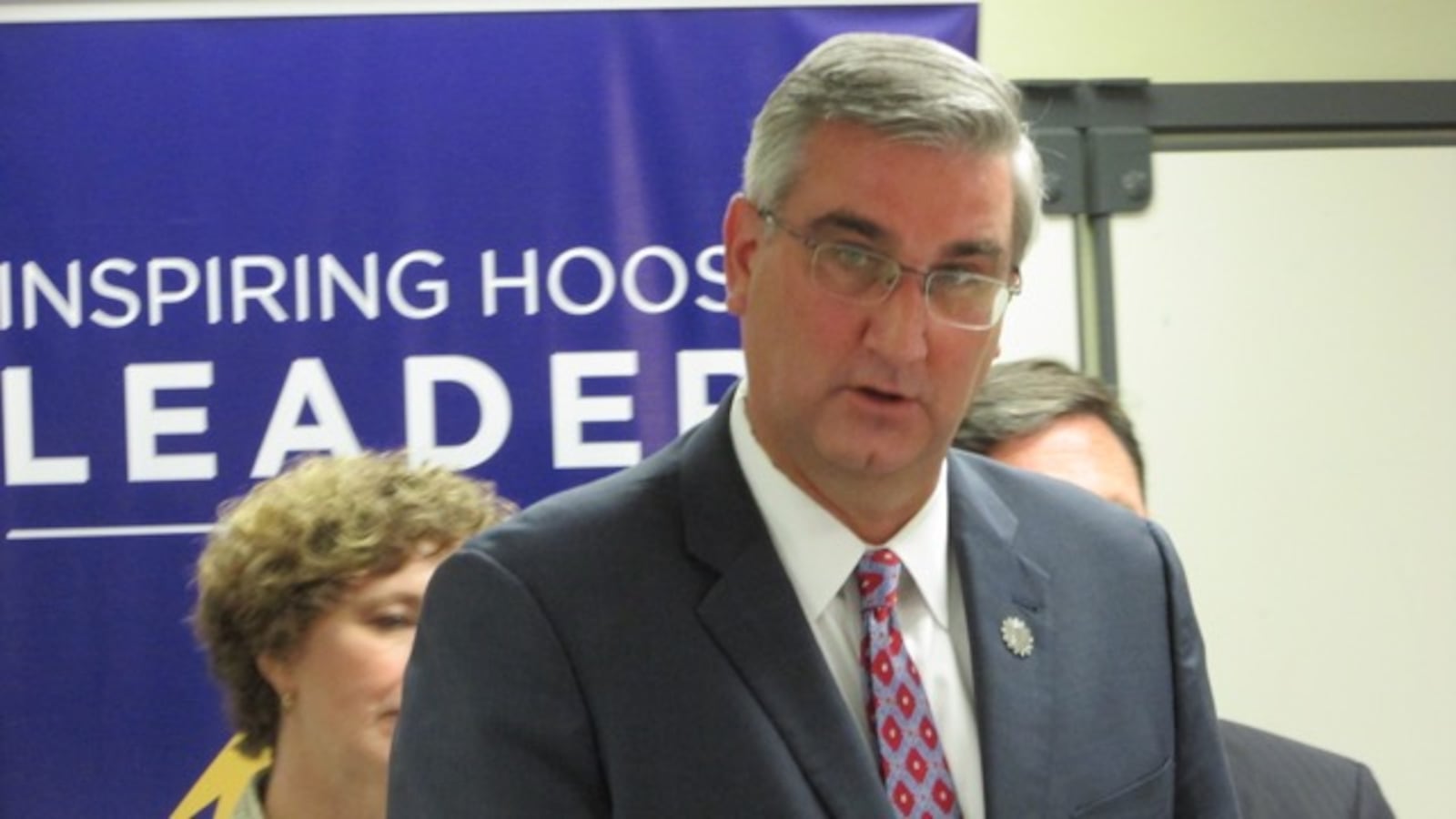This is one of two stories summarizing the basics facts about Indiana’s two major party candidates for governor when it comes to education. A more detailed story about Eric Holcomb’s policy positions can be found here. To learn more about John Gregg, go here. To see all of Chalkbeat’s “basics” stories, go here. To read all of Chalkbeat’s 2016 election coverage, go here.
Tune in to our live blog on Election Day for highlights from the field and updates on the races as results trickle in.
Eric Holcomb has promised to be different from his predecessor when it comes to education if elected governor.
The Republican candidate says he’ll avoid the loud political fights that defined Gov. Mike Pence’s battles with Democratic state Superintendent Glenda Ritz.
But Holcomb’s education policies are largely in line with Pence’s.
The Republican candidate took Pence’s place on the ballot in July after Pence dropped out of the race to join Republican presidential nominee Donald Trump as his vice presidential running mate.
As a result of his late entry into the race, Holcomb’s education policies are less detailed than his opponent, Democrat John Gregg who is making his second run for governor after losing a close race to Pence in 2012.
Holcomb has also never before been elected to public office. So, unlike the former House speaker Gregg, he has little track record of votes or positions on the issues.
But in interviews, Holcomb, 48, has emphasized a desire to work more collaboratively with the next superintendent — Ritz or her Republican opponent, Jennifer McCormick — to try to move on from the many battles between Pence and Ritz.
Holcomb also says he wants a better state test to replace ISTEP, but he has struggled to explain how his vision for the exam would be different from the much maligned test that the state has used in recent years.
Early lessons and role models
Holcomb’s mother was a teacher, so he spent hours at her side when she was grading papers, both at home and after school. He credits her as his earliest example of work ethic and the value of learning.
After graduating Pike High School in Indianapolis and Indiana’s Hanover College, he spent six years in the Navy and then got involved in politics. For the next 20 years, Holcomb worked for Indiana Republicans, but nearly all of his work was out of the public eye.
He started out as an aide to Indiana congressman John Hostettler before first dipping his toe into politics with an unsuccessful run for congress in 2000.
He served as a campaign adviser to Mitch Daniels during Daniels’ first run for governor in 2003 then stayed on, working in the Daniels administration for seven years.
In 2010, Holcomb took over as state Republican Party chairman, a job he held for three years before leaving to become chief of staff to Repbulican U.S. Sen. Dan Coats.
Holcomb attempted his second run for office in 2013 when he ran for his boss’ seat after Coats announced his retirement, but ended up dropping out of that race when Pence offered him the lieutenant governor job in March.
If Holcomb wins the election on Nov. 8, it will be his first elective victory, so voters don’t have much a personal record they can review. It’s not clear how closely Holcomb will follow the lead of the two Republican governors he served, both of whom shaped a more aggressive Republican education strategy that included more test-based accountability for teachers, students and schools, and support for expanding vouchers and charter schools.
A different tone at the statehouse
Despite his connections to Daniels and Pence, Holcomb has said he wants to set a new tone as governor that would be more cooperative than during the education battles of the last two administrations.
Under Daniels, the state expanded charter school sponsoring, launched the state private school voucher program, established an A-F school grading system and put in place a tough new teacher evaluation system.
After Ritz, a Democrat, scored an upset win in the 2012 superintendent’s race, Pence moved aggressively to block the policy changes she proposed.
The cumulative effect left many teachers feeling weary of politics and unfairly attacked.
From his introduction as a gubernatorial candidate, Holcomb has pledged to take steps to improve the relationship with the state superintendent and show more overt support for teachers.
Big differences with Democrats remain
On policy, Holcomb and Ritz are still far apart. Consider:
Testing. Ritz wants to junk the state’s ISTEP exam in favor of a series of smaller tests that could be scored more quickly and the results returned faster to teachers to use in the classroom. She has argued her approach would reduce test anxiety around the once-a-year exam for students and make the exams more useful.
Holcomb insists the state test should only be given once a year. He also has called for the scores to be delivered to teachers more quickly but has not explained how to do that while keeping the same basic design as ISTEP.
School choice. Holcomb describes himself as a strong supporter of school choice programs, like charter schools and vouchers. And he said he wants the state to take action to try to improve schools with persistently low test scores, even if it’s not necessarily through controversial state takeovers of local schools that the state tried under Daniels.
Preschool. Even where he agrees with Ritz and Gregg — that the state should expand its preschool pilot program — Holcomb takes a different approach. He said he does not think the state should offer to pay for preschool for any four-year-old who enrolls as Ritz and Gregg have proposed, just those from poor families. He also envisions a slower expansion of the five-county pilot that serves about 1,500 poor children today, perhaps a few more counties at a time.

